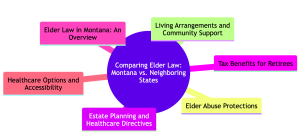
Elder Law and Disability Rights in Montana: Understanding Your Protections
February 18, 2024
The Impact of Montana’s State Tax Filing Changes on Seniors
February 18, 2024When considering retirement and finding a place to spend those golden years, comparing elder law between states becomes important. Montana, with its serene landscapes and retiree-friendly policies, offers a unique legal environment for the elderly. This article embarks on a comparative journey, examining how elder law in Montana stands alongside the practices in neighboring states like Idaho, Wyoming, and North Dakota. We delve into the specifics of each state’s approach to elder law, highlighting the distinctive aspects and regulations that shape the legal landscape for retirees.
Key Takeaways
- Elder law plays a pivotal role in safeguarding the rights and welfare of seniors.
- There are notable differences in how Montana and its neighboring states approach elder law.
- Montana introduces unique elder law regulations that distinctly benefit its retirees.
- A comparison of tax benefits and healthcare options reveals a varied landscape across these states.
- Seniors have access to a wealth of resources and legal assistance, varying by region.

Elder Law in Montana: An Overview
Elder law in Montana encompasses a broad spectrum of legal matters, from estate planning and healthcare directives to guardianship, all designed to protect the interests of the aging population. This legal framework ensures that seniors in Montana can navigate their later years with dignity and security, backed by laws that reflect their specific needs and challenges.
Comparing Elder Law Aspects: Montana vs. Neighboring States
| Aspect | Montana | Idaho | Wyoming | North Dakota |
| Estate Planning | Comprehensive laws for asset distribution | Similar, with nuances in execution | Focuses on simplified processes | Robust, with unique provisions for agricultural lands |
| Healthcare Directives | Advanced directives and POLST forms emphasized | Similar, with additional focus on living wills | Broad acceptance of directives, with state-specific forms | Emphasis on healthcare directives, with detailed regulations |
| Guardianship | Specific criteria and processes for guardianship | Similar, but with variations in guardian powers | Streamlined process for emergency guardianship | Detailed process, focusing on the rights of the ward |
Montana’s approach to elder law demonstrates a commitment to providing seniors with the legal tools they need to manage their affairs effectively. Whether it’s through comprehensive estate planning, clear healthcare directives, or guardianship laws that prioritize the well-being of the elderly, Montana stands out for its dedication to the rights and interests of its aging population. Comparatively, while Idaho, Wyoming, and North Dakota each offer robust elder law frameworks, Montana’s unique aspects cater specifically to the needs of its retirees, making it an attractive state for those seeking peace of mind in their golden years.
Estate Planning and Healthcare Directives
In Montana, estate planning and healthcare directives form the cornerstone of elder law, ensuring individuals can manage their affairs and healthcare decisions with clarity and confidence. The state’s laws facilitate a comprehensive approach to estate planning, allowing residents to dictate the future of their assets and healthcare preferences effectively.
- Will: Specifies how your assets will be distributed upon death.
- Trust: Manages your assets for the beneficiaries you designate.
- Durable Power of Attorney: Appoints someone to manage your financial affairs if you’re unable.
- Healthcare Power of Attorney: Designates someone to make healthcare decisions on your behalf.
- Living Will: Outlines your wishes for medical treatment if you’re incapacitated.
These documents are pivotal in safeguarding your wishes, ensuring they are honored and executed as intended.
Guardianship Laws
Overview of Guardianship Laws in Montana
Montana’s guardianship laws are designed to protect individuals who cannot make decisions for themselves due to incapacity. The state emphasizes the protection of these individuals’ rights and well-being, ensuring guardians act in their best interests.
Guardianship Laws in Idaho, Wyoming, and North Dakota
- Idaho: Similar to Montana, focusing on the incapacitated person’s best interests but with specific provisions on the appointment process.
- Wyoming: Offers a streamlined approach for emergency guardianship, emphasizing the temporary protection of the individual.
- North Dakota: Detailed process, focusing on maximizing the ward’s independence and self-reliance.
Comparing Elder Law: Tax Benefits for Retirees
Montana offers several tax benefits for retirees, making it an attractive state for those seeking to maximize their retirement income. These benefits include exemptions on certain retirement income sources and property tax assistance programs for seniors.
Tax Benefits Comparison
| Benefit | Montana | Idaho | Wyoming | North Dakota |
| Retirement Income Tax | Some exemptions | Taxable with credits | No income tax | Some exemptions |
| Property Tax Assistance | Available for seniors | Varies by county | Low property tax rates | Credits available |
This table illustrates Montana’s commitment to providing financial relief for its senior residents, contrasting with the varying levels of support in neighboring states. (1)
Healthcare Options and Accessibility
Montana’s healthcare system offers various services and programs tailored to meet the needs of its senior population, ensuring they have access to quality care and support.
- State-Specific Programs: Montana has initiatives like the Big Sky Rx Program to help cover medication costs.
- Rural Healthcare Accessibility: Efforts to improve healthcare access in rural areas through telemedicine and mobile clinics.
- Long-Term Care Options: A range of services from home-based care to assisted living facilities.
Comparing healthcare options in neighboring states:
- Idaho: Similar focus on rural healthcare accessibility, with additional Medicaid expansion.
- Wyoming: Emphasizes telehealth services due to its rural nature.
- North Dakota: Offers comprehensive long-term care services, with strong support for home-based care.
Montana’s approach to healthcare for seniors emphasizes accessibility and affordability, ensuring residents have the support they need to live healthy, fulfilling lives.
Elder Abuse Protections
Montana takes a strong stance against elder abuse, offering a comprehensive array of legal protections and support services. The state’s legal framework includes stringent laws against physical, emotional, and financial abuse, ensuring seniors live with dignity and safety.
Protections Against Elder Abuse: Montana and Neighboring States
| State | Legal Protections | Support Services |
| Montana | Comprehensive statutes against abuse, mandatory reporting | State-funded assistance programs, legal aid |
| Idaho | Similar legal protections, emphasis on prevention | Community-based support, advocacy services |
| Wyoming | Strong legal framework, with penalties for abusers | Limited but focused support services |
| North Dakota | Detailed abuse prevention laws, wide reporting requirements | Extensive support and intervention programs |
Montana’s approach not only penalizes abusers but also focuses on prevention and support for victims, setting a robust example in the region.
Living Arrangements and Community Support
Montana offers a variety of living arrangements for seniors, catering to different needs and preferences. From assisted living facilities that provide care and support for daily activities to retirement communities designed for active seniors, the state ensures that its elderly population has access to comfortable and supportive living environments. These arrangements are complemented by a strong network of community support services, including social activities, health and wellness programs, and transportation services, ensuring seniors in Montana lead fulfilling lives.
Comparatively, Idaho, Wyoming, and North Dakota also offer a range of living options for seniors, but the level of community support and the availability of services can vary. Montana distinguishes itself with a particularly strong emphasis on community engagement and support, ensuring seniors not only have a place to live but a community to thrive in.
Wrapping Up
Understanding the nuances of elder law and the available support systems across state lines is crucial for retirees and their families. Montana’s comprehensive approach to elder law, from robust protections against abuse to diverse living arrangements and strong community support, sets a high standard for elder care. For those navigating these complex legal landscapes, Montana Elder Law offers invaluable expertise and guidance. Their dedication to protecting and supporting Montana’s seniors ensures that individuals can make informed decisions about their future with confidence and peace of mind.
Reference:
(1)

